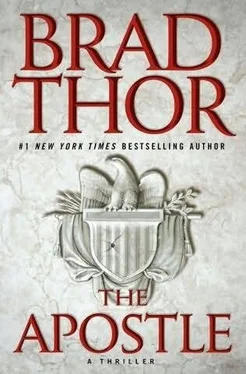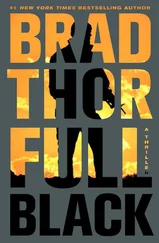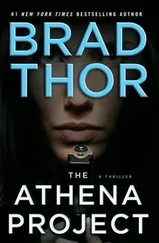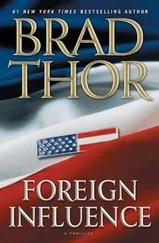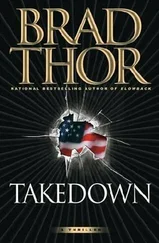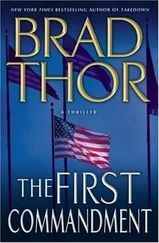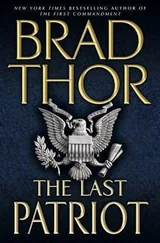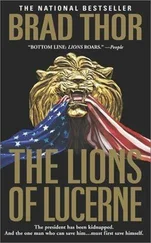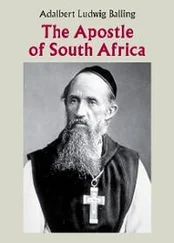Brad Thor - The Apostle
Здесь есть возможность читать онлайн «Brad Thor - The Apostle» весь текст электронной книги совершенно бесплатно (целиком полную версию без сокращений). В некоторых случаях можно слушать аудио, скачать через торрент в формате fb2 и присутствует краткое содержание. Жанр: Триллер, на английском языке. Описание произведения, (предисловие) а так же отзывы посетителей доступны на портале библиотеки ЛибКат.
- Название:The Apostle
- Автор:
- Жанр:
- Год:неизвестен
- ISBN:нет данных
- Рейтинг книги:5 / 5. Голосов: 1
-
Избранное:Добавить в избранное
- Отзывы:
-
Ваша оценка:
- 100
- 1
- 2
- 3
- 4
- 5
The Apostle: краткое содержание, описание и аннотация
Предлагаем к чтению аннотацию, описание, краткое содержание или предисловие (зависит от того, что написал сам автор книги «The Apostle»). Если вы не нашли необходимую информацию о книге — напишите в комментариях, мы постараемся отыскать её.
The Apostle — читать онлайн бесплатно полную книгу (весь текст) целиком
Ниже представлен текст книги, разбитый по страницам. Система сохранения места последней прочитанной страницы, позволяет с удобством читать онлайн бесплатно книгу «The Apostle», без необходимости каждый раз заново искать на чём Вы остановились. Поставьте закладку, и сможете в любой момент перейти на страницу, на которой закончили чтение.
Интервал:
Закладка:
Two of Massoud’s men brought in an ancient carpet and unrolled it along the floor. It was a red, elephant-foot pattern known as a Bohkara. Simonov could only imagine what such a rug would fetch in Moscow or St. Petersburg.
Other men entered bringing blankets, a pillow, a power strip, and an extension cord, which would allow him to run his electronic equipment off the compound’s generator.
Satisfied that his guest was on his way to being situated, Mullah Massoud informed him that he would see him for tea in twenty minutes.
Simonov thanked his host and closed the door. From the leather holster beneath his tunic, he withdrew his 9mm CZ-75 pistol and placed it on the desk next to a suppressor from his coat pocket. Inside the compound, he had no need for any of his weapons. “Ze talibano milmayam,” he said aloud in Pashtu. “I am a guest of the Taliban.”
The traditional code of honor among the Pashtun, known as Pashtunwali, dictated every aspect of their lives and was very explicit. One of the most important edicts of Pashtunwali dealt with hospitality and the treatment of guests. Once a Pashtun invited someone into his home, he was honor-bound to protect that guest at all costs, even if it meant fighting to his own death to protect him.
As Simonov unpacked his gear, he ran through the arguments Mullah Massoud had initially raised about the operation and how he would counter them if they came up again.
The bottom line was that the time was right for the Taliban to finally move beyond al-Qaeda.
In 1998, two years after seizing majority control of the country, the Taliban had molded Afghanistan into the purest Islamic state on the planet. Their ambassadors were shuttling back and forth to America and were close to signing a peace treaty with the Northern Alliance fighters-the last holdouts in Afghanistan against full Taliban control of the country. The Soviets were long gone, self-serving Afghan warlords were being dealt with, and the Taliban were on the brink of bringing stability to their war-ravaged nation. In short, they had achieved almost everything they wanted.
Then Osama bin Laden and his al-Qaeda organization carried out the bombings of the American embassies in Kenya and Tanzania. The Americans had responded by firing missiles into Afghanistan. Angered, Taliban leader Mullah Omar broke off peace talks and disengaged himself from the Americans. The war with the Northern Alliance picked up speed and things gradually deteriorated. Just when it looked as if things couldn’t get worse, September 11 happened and the Americans invaded. In short, every problem the Taliban had could be traced to al-Qaeda. It was time for a divorce.
Mullah Massoud had always been smart enough to see al-Qaeda for what they really were-a liability. They were foreigners who put their global jihad ahead of everything else. They didn’t care what happened to Afghanistan and its people in the process. Massoud, on the other hand, did, and that was why he had agreed to go along with Simonov’s operation.
In typical Russian fashion it was elegantly simple. Simonov had found a way to deal al-Qaeda a death blow, but to make it look as if the Americans had been behind it. As the ineffective Mullah Omar drowned with the weight of the dying al-Qaeda organization tied around his neck, Mullah Massoud would step into the vacuum of power and would take over as supreme leader of the Taliban.
With the windfall they intended to reap from al-Qaeda’s demise, they could purchase all the weaponry and hardware they needed. They would mount a devastating offensive against the Americans and their coalition partners and send them running from Afghanistan like whipped dogs. And what the Russians asked for in return for their help was a pittance.
The Russians had learned their lesson and had no desire to repeat the mistakes of the 1980s. Afghanistan had been a Soviet graveyard. This time, they wanted nothing to do with the governance of Afghanistan, only the ability to help increase and share in its prosperity. How the Russians would use their influence in the region was of no concern to the Taliban. As long as they stayed out of Afghan affairs, the relationship showed significant promise.
Simonov unpacked his satellite uplink equipment and reflected on how ironic it was that Russia was now funding and orchestrating instability within Afghanistan, exactly as America had done to the Soviets in the 1980s.
But the Russians needed to be very careful. Times had changed. America had many partners in Afghanistan, and if Russia’s role in promoting insurgency was ever proven, the international repercussions would be extraordinarily severe.
He was still running these points through his head when he heard a crash as his door was kicked in.
The Russian reached for his CZ atop the desk, but caught himself and stopped. Standing at rigid attention in the doorway was Mullah Massoud’s mentally challenged brother, Zwak.
He wore a blue hooded sweatshirt and boots two sizes too big. One of his pants legs was rolled up to just beneath his knee and he clutched an AK-47 to his side, the top of its barrel wrapped with blue tape. He had the “official” job of guarding the village well and watching for spies. Carrying the rifle was a source of pride and made him feel equal to the other warriors who fought for his brother.
Zwak was thirty-one years old, stood only a hair above five feet tall, and had a coarse, dark beard that followed his jaw line, exactly like his brother’s. Each morning the two men shaved their upper lips together in a cracked mirror in the courtyard. When not searching for spies or guarding the well, spending time with his brother was Zwak’s favorite thing to do.
Simonov had great respect for how Massoud treated his childlike brother. He never mistook the man’s compassion for weakness. He knew that Massoud was anything but weak, and as soon as his country was rid of al-Qaeda, he would be the Taliban commander under whom the country would be united.
The Russian studied his visitor. An intent look of satisfaction spread across Zwak’s face as he realized he had startled Simonov. He was exceedingly proud of his accomplishment.
Sergei approached and gave the man a military inspection, which Zwak took very seriously. He stood as straight as he could while the Russian examined his clothing and then his weapon.
Shaking his head, Simonov crossed the room to retrieve something from his pack. Zwak removed his boots and stepped inside to see what the Russian was doing.
When Sergei turned, he held in his hands a pair of white hi-top basketball shoes. Despite their hatred for the West and Western culture, the only thing the Taliban prized as highly as their rifles was basketball shoes.
Zwak couldn’t believe his eyes. Simonov smiled as he handed them to him. “Don’t let anyone take these from you,” he said, though he didn’t believe there was anyone in Afghanistan dumb enough to rob the brother of Mullah Massoud.
Forgetting custom, Zwak dropped the shoes on the floor and slid his feet inside. They weren’t a perfect fit, but they were much better than the oversized boots he had been wearing for as long as he could remember.
Zwak tested the shoes by bouncing up and down on his toes. His excitement registered in the smile on his face.
But as he remembered his purpose for coming to the room, his smile faded and Zwak was all business. “Tea,” he said. “Tea now.”
The Russian smiled back and said in Pashtu, “Tell your brother I will be there in a moment.”
Snatching up his rifle, Zwak slung it over his shoulder and headed for the door. As he reached it he turned back around. Simonov assumed a thank you was coming. Instead, Zwak repeated, “Tea now.”
“Soon,” said the Russian, “tea soon,” and he watched as the man left his room and stepped out into the courtyard to show off his new shoes to his brother’s Taliban soldiers.
Читать дальшеИнтервал:
Закладка:
Похожие книги на «The Apostle»
Представляем Вашему вниманию похожие книги на «The Apostle» списком для выбора. Мы отобрали схожую по названию и смыслу литературу в надежде предоставить читателям больше вариантов отыскать новые, интересные, ещё непрочитанные произведения.
Обсуждение, отзывы о книге «The Apostle» и просто собственные мнения читателей. Оставьте ваши комментарии, напишите, что Вы думаете о произведении, его смысле или главных героях. Укажите что конкретно понравилось, а что нет, и почему Вы так считаете.
